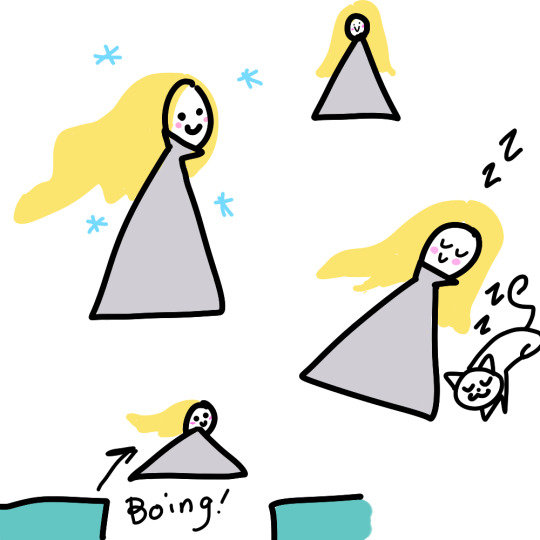Cleo She/They, 27. I care about the Untamed and GW2 on this blog right now. Pls no gw2 spoilers, i'm in LW1 rn
Don't wanna be here? Send us removal request.
Text
People can handle evil characters(for the most part--usually they twist their behavior and water it down) but people really can't handle good characters that lose their head or lose themselves and have a moment of fallen grace. Fandom has shown this time and time again. They really look at them as worse than the initial evil.
469 notes
·
View notes
Text
Everyone on tumblr has Conditions. maladies. I log onto tumblr and my mutuals are unwellposting. Conditions I didn't even know existed and sound like dark curses but I will see a post from friend like "died about 60% today, fine now. Made egg on toast #yummytoast". There are so many people in this world with life experiences
12K notes
·
View notes
Photo






#I can hear the sound of it in my head#that whooshing roar of the flames#the feeling of the heat on Zuko's skin#The rock chips flying through the air#his foot scraping against the ground as he holds his stance#we don't talk enough about the inversion of the colors#Zuko's red good natural fire against Azula's uncanny blue flames#We've watched that red fire burn so much over the course of the series#often from Zuko himself#But this time we are rooting for that awesome destructive power to succeed#to finally be strong enough#to withstand the lightning
58K notes
·
View notes
Text
Imagine romanticizing the grind when you live in a universe that has a large expanse of grasslands and colorful endemic birds
18K notes
·
View notes
Text
also lrt
#lol this reminds me of when i read people speculating on what kind of parent jc would be and coming to the conclusion #that he would raise super disciplined kids who would be afraid to talk back and wilt easily #is a-ling a joke to you #we KNOW what kind of kids he raises he raises perfect spoiled brats with no respect for their elders and who adore and trust him (via @autumnslantern)
and we literally know exactly why this is: because he yells and stomps and blusters about all day, but has never hurt jin ling or given him reason to doubt how cherished he is. jin ling grew up on the fearsome sandu shengshou's knee and never felt unsafe or unloved for a moment! "how dare you! not even my uncle hits me!" (<- ACTUALLY NOTEWORTHY BEHAVIOUR FOR CHINESE PARENTS, SORRY TO SAY.) WHY would he respect his elders when his elders are jiang cheng. and why would he fear his elders? when his elders are jiang cheng??
257 notes
·
View notes
Text
The more I read into reports about industrial and transportation accidents the less I feel like “operator error” actually exists
9K notes
·
View notes
Text
she is a beautiful triangle


she is beautiful triangle
5K notes
·
View notes
Text
I love scam calls that are easily verifiably false. “Your mortgage is about to default.” Cool 👍 I don’t have one of those
11K notes
·
View notes
Text
Don’t….. fuckin power wash your roof. Don’t let anyone power wash your roof.
54K notes
·
View notes
Text
it's so funny to me when they have little boys in tv shows and then the next season they are stretched twice their previous length like taffy. and we just pretend like we don't notice. it's like when there's a birthing scene and then they cradle a giant ten month old fatass baby. to be clear i am not complaining easily one of the top five most delightful breaks of suspension of disbelief
632 notes
·
View notes
Text
I love you shows with planned & definitive endings, I love you epilogues that prove the happy ending lasts, I love you finales that feature direct parallels to earlier seasons, I love you cast members that left years ago but came back to say goodbye, I love you well crafted & impactful final lines, I love you fitting send offs for the characters I love
24K notes
·
View notes
Text






Here are some bats cuddling with stuffed animals
4K notes
·
View notes
Text
I just want to say, if you've ever worked a low-level office job and thought 'wow this is piss-easy', that's not a sign that the work you were doing is objectively easier than other types of work, it's a sign that you were good at it.
by which I don't mean 'stop de-valuing office work' bcos that's not a real problem, no-one is doing that, I just feel like a lot of young people aren't aware that e.g. being able to type fast and accurately, open up a computer program you've never used before and figure it out unaided, are marketable skills, not things that 'everyone' knows how to do.
I've worked in 'easy' office jobs for 6 years now and believe me, some people are bad at them & do not find them easy.
30K notes
·
View notes
Text
Lego bottle
55K notes
·
View notes
Text
hey don't cry. 7,401 species of frog in the world, ok?
198K notes
·
View notes
Text

the line between naïveté and hopefulness is almost invisible
2K notes
·
View notes